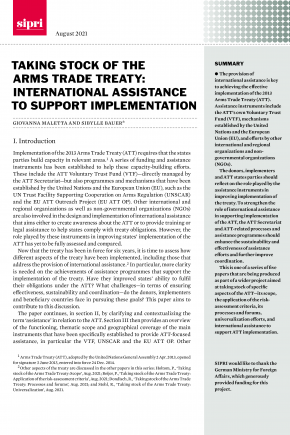Taking Stock of the Arms Trade Treaty: International Assistance to Support Implementation
The provision of international assistance is key to achieving the effective implementation of the 2013 Arms Trade Treaty (ATT). Assistance instruments include the ATT’s own Voluntary Trust Fund (VTF), mechanisms established by the United Nations and the European Union (EU), and efforts by other international and regional organizations and non-governmental organizations (NGOs).
The donors, implementers and ATT states parties should reflect on the role played by the assistance instruments in improving implementation of the treaty. To strengthen the role of international assistance in supporting implementation of the ATT, the ATT Secretariat and ATT-related processes and assistance programmes should enhance the sustainability and effectiveness of assistance efforts and further improve coordination.
This is one of a series of five papers that are being produced as part of a wider project aimed at taking stock of specific aspects of the ATT—its scope, the application of the risk-assessment criteria, its processes and forums, universalization efforts, and international assistance to support ATT implementation.
I. Introduction
II. Definition and scope of international assistance
III. The main ATT-focused assistance instruments
IV. Other ATT-relevant assistance
V. Supporting states’ implementation of the ATT: Main challenges and
good practices
VI. Conclusions and recommendations


